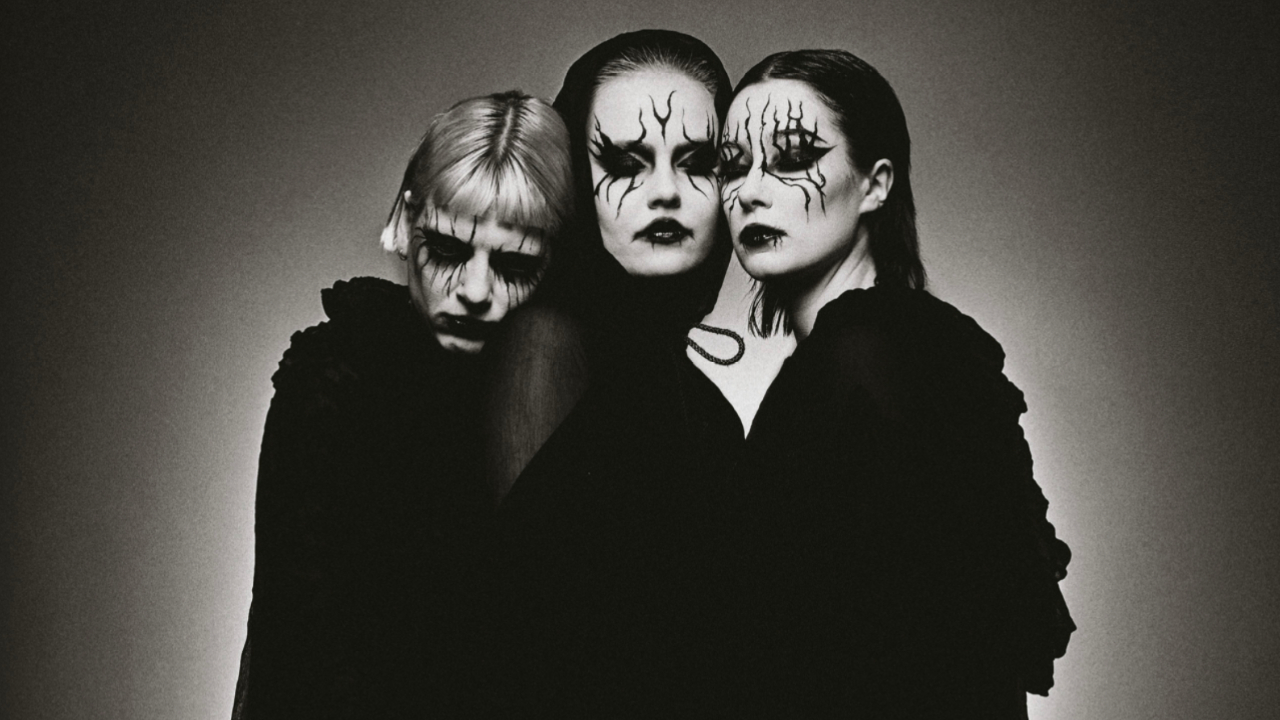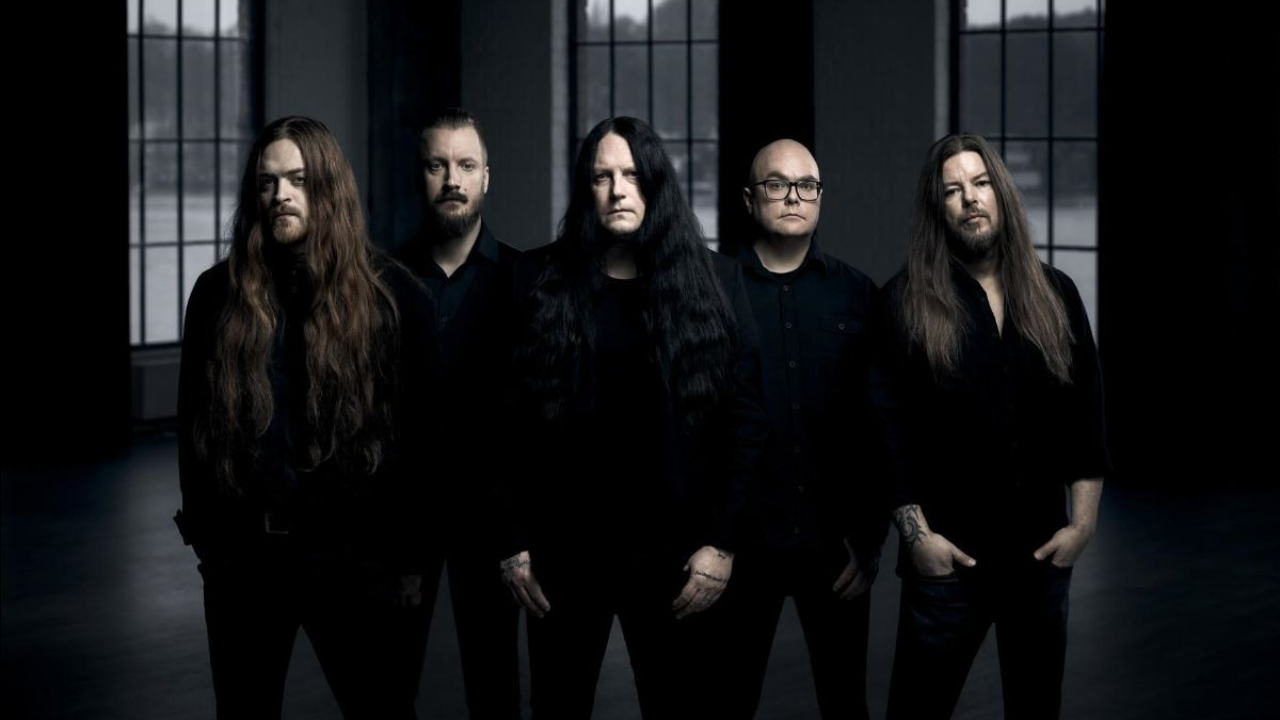"I feel that black metal is a really feminine genre." Meet Witch Club Satan, the Necrobutcher-approved feminist trio pushing the boundaries of metal's most extreme subgenre
Witch Club Satan are powered by female rage and are rewriting the black metal rulebook

Even in a scene as boundary-pushing as black metal, Witch Club Satan are radical. While their sound is rooted in raw chaos, it’s fuelled by a unique and powerful perspective: female rage. The Norwegian trio take inspiration from injustices aimed at women over generations, reclaiming words that have been used to diminish them – ‘witch’, ‘hysterical’, ‘whore’, among others – to find empowerment within themselves. “I feel that black metal is a really feminine genre,” says Witch Club Satan drummer Johanna Kleive. “Because women have screamed throughout history. Many people who have seen us perform tell us it feels like we scream not just one woman’s scream, but every woman’s scream.”
The three words that make up the name Witch Club Satan all carry meaning, though it’s the third and final word that’s most associated with black metal. “Satan, for us, represents a kind of joker figure,” says guitarist Nikoline Spjelkavik. “It represents rebellion and freedom.”
Formed at the start of 2022 and hailing from different parts of Norway, the trio – completed by bassist Victoria Røising, with all three sharing singing duties, like
“a three-headed troll, as we say in Norway” – met via theatre school. They initially had the idea for a project that combined music and theatre. "We knew there was potential in the energy of the three of us,” Victoria says. “After two years of lockdown, we had this explosion that we needed to get out somehow. We found there was only one way to do it, and that was black metal.”
There was just one problem – they didn’t know how to play the instruments. Johanna had some experience in playing percussion, but they were otherwise starting from scratch. Yet in true black metal style, they didn’t let that stop them, and taught themselves to play. “That is also an act of feminism,” Victoria says. “Doing something that we don’t know, that we’re not really good at, and still having confidence. That feels not typical for women, especially women in their 30s.”
Both Victoria and Nikoline grew up listening to black and extreme metal, and felt it was an important part of their identities. “Coming back to it as an adult has been a bit like discovering myself and my identity again,” says Nikoline. “It feels good to use that energy again,” adds Victoria. For Johanna, whose upbringing was soundtracked by jazz and classical music, it was a whole new field to explore. “I had to learn from this genre, and learn how to find my voice in it,” she explains. “Suddenly I realised it has everything to do with me, and the girls as well.”
Witch Club Satan have caught the attention of some of black metal’s leading lights. One person who has been following the band since the beginning is Mayhem bassist and co-founder Necrobutcher, whom Johanna refers to as a “mentor”. “We sent him our first demo and he was like, ‘This is the most primitive thing I’ve heard since the 80s,’” laughs Nikoline. “I think he thought it was so bad in a way, but so pure that he could recognise himself in that,” says Victoria. “He gave us the courage in the beginning to do this,” Johanna adds. “He said: ‘The black metal scene needs you.’”
Witch Club Satan’s self-titled debut album was released, fittingly and deliberately, on March 8, 2024 – International Women’s Day. It was co-produced by former Satyricon/Celtic Frost guitarist Anders Odden and was released independently, without a label or management – something that was vital for the band. “We’re open to different forms in the future,” explains Victoria, “but it was really important for this first album to be us and our project, and to define what we are without any outside influences.”
Metal Hammer Newsletter
Sign up below to get the latest from Metal Hammer, plus exclusive special offers, direct to your inbox!
The record itself is a dense, multi-layered whirlwind of blastbeat-laden black metal, eerie spoken word mantras, and moments of ethereal respite, like the beautiful Mother Sea. The feminist angle is clear, with songtitles such as Birth, Wild Whores, and Fresh Blood, Fresh Pussy. “To be angry women is still very radical for some,” says Victoria. “For me it’s been a challenge. But it’s really freeing, and it’s important to use the anger for something you believe is a good thing.” “We want to understand what’s inside a woman when she’s not being kind and beautiful. We want to deconstruct and open what’s inside of her,” says Johanna. “It’s a big contrast between what you see in a woman and what’s inside.”
A recurring theme throughout the album is the notion of exploring what it is to be a witch, both on a personal and historical level. The band describe themselves as practising witches, explaining that it means different things to each of them. “I think we all agree though,” Nikoline says, “that we find music to be magic.”
The trio researched old witch trials in their local area. The song Steilneset refers to the Steilneset Memorial monument in Vardø, Norway, which commemorates the trial and execution of 91 people for witchcraft in the 17th century. “The historical witch trials were really brutal in Norway,” says Victoria. “We feel that the spirits of these witches have somehow come to us. They are telling their stories through our lyrics.”
“We all feel like if it was hundreds of years ago, we might have been ones that were picked out as witches,” says Nikoline. “Being loud and clear and in contact with nature. So the more we read about it, the more eager we were to speak the words of these women. To really try to hear them, what they would think and say in society today, what they would stand for.”
Witch Club Satan are certainly not afraid to stand up for what they believe in politically. Mother Sea is about environmentalism, a prayer to the earth to forgive humanity for what it has done to nature. They have dedicated their song Black Metal is Krig to the crisis in Gaza, while Hysteria calls for listeners to “wake up” to the world around them. “We really feel like there’s a slumbering going on,” says Nikoline. “You hear that 10,000 kids are killed and you kind of snooze your alarm. We’re all very moved by what’s happening in Gaza, we’re not afraid of using the Palestinian flag at our shows. If you’re making art at this time you have to address the global, you have to show where you stand: that you stand for all human lives and no one should be oppressed.”
Nor are Witch Club Satan afraid to take on metal’s established hierarchy. They spoke out against Pantera playing at Oslo’s Tons of Rock festival in 2023, due to Phil Anselmo shouting “white power” and making a Nazi salute at a concert in 2016. With depressing predictability, it resulted in them being called “fucking feminists” and “woke” online, and even receiving actual death threats.
“The feeling that music should be unpolitical to me feels impossible,” says Nikoline. “If you have a microphone and amplifiers, it’s powerful. To me, music can never be divided from politics. At its core black metal is punk music; that’s how we see it.” They didn’t pay much attention to the Pantera backlash (“We like that people have strong opinions about us,” says Nikoline). What was more interesting, they say, was when people began to challenge them with regards to the bands they cite as inspiration.
“People say things like, ‘What about Mayhem? They have had some really problematic political statements’,” says Victoria. “And that is true. Of course it’s important to give people another chance, to allow them to change. But then they have to be clear that change has happened.” For Witch Club Satan themselves, it’s important to address black metal’s connections to the far right and Nazi imagery and ideology.
“It’s not really been spoken seriously about,” she says. “It’s left out of the history. It’s problematic, and that’s important for us to say. We want this project to be really transparent, not only with our feminist statements, but humanism in general.” “This is a liberation project in many ways,” Nikoline says. “And it has to be everyone’s freedom that we fight for.”
The trio’s backgrounds in the performing arts are an important part of what Witch Club Satan do. Nikoline and Victoria run their own company, Lost And Found Productions, which specialises in experimental theatre. “People wondered if we ‘meant it’, or if we were doing an art project,” says Nikoline. “To us, theatre is serious business. It’s an art form that’s more real than life itself.”
While their ritualistic live shows take inspiration from the aesthetics of black metal, they also unfold into a universe that’s all their own, complete with an act structure, blood, gore, costume changes (including nudity), and allowing themselves in a feminist fashion to be really, really ugly. “Like monstrous figures,” explains Nikoline. In keeping with their inclusive nature, Witch Club Satan are planning to build a whole community for fans and like-minded people to congregate – the ‘Club’ part of their name. They are even writing a manifesto to embody their perspective and ideas.
“As well as our concerts,” Nikoline says, “we do sabbaths or meetings with people where we do different things like sing together, have meals together, commemorate witches from the local area. We try to make it a meeting place. And we will continue this and open an organisation you can be a member of. It’s exciting. It’s for anyone who’s interested!” Johanna smiles as she sums up their ambitions. “We want to create a movement of witches.”
Hannah May Kilroy has been writing about music professionally for over a decade, covering everything from extreme metal to country. She was deputy editor at Prog magazine for over five years, and previously worked on the editorial teams at Terrorizer and Kerrang!. She currently works as the production editor for The Art Newspaper, and also writes for the Guardian, Classic Rock and Metal Hammer.


